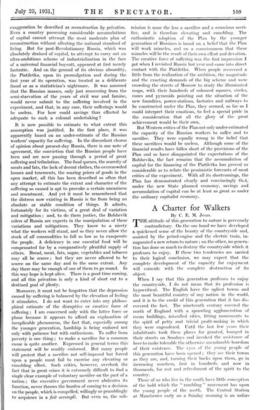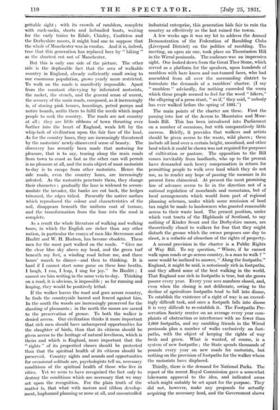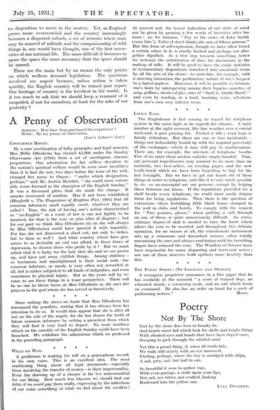A Charter for Walkers By C. E. M. Joni). T HE
attitude of this generation to nature is perversely contradictory. On the one hand we have developed a quickened sense of the beauty of the countryside and, assisted by the petrol-engine and the electric train, in- augurated a new return to nature ; on the other, no genera- tion has done so much to destroy the countryside which it professes to enjoy. If these two tendencies are carried to their logical conclusion, we may expect that the complete development of the capacity for enjoyment will coincide with the complete destruction of its object.
When I say that this generation professes to enjoy the countryside, I do not mean that its profession is hypocritical. The English have the ugliest towns and the most beautiful country of any nation in the world. and it is to the credit of this generation that it has dis- covered the fact. The nineteenth century covered the north of England with a sprawling agglomeration of mean buildings, miscalled cities, fitting monuments to the spirit of petty and trivial profit-making in which they were engendered. Until the last few years their inhabitants took these places for granted, lounged in their streets on Sundays and invoked the assistance of beer to make tolerable the otherwise unendurable boredom of their existence. The eyes of the young people of this generation have been opened ; they see their towns as they are, and, turning their backs upon them, go in increasing numbers, first in hundreds and now in thousands, for rest and refreshment of the spirit to the country.
Those of us who live in the south have little conception of the hold which the " rambling " movement has upon the young people of the north. The Central Station at Manchester early on a Sunday morning is an unfor- gettable sight ; with its crowds of ramblers, complete with ruck-sacks, shorts and hobnailed boots, waiting for the early trains to Edale, Chinley, Castleton and the Derbyshire moors, it might lead one to suppose that the whole of Manchester was in exodus. And it is, indeed, true that this generation has replaced beer by " hiking " as the shortest cut out of Manchester.
But this is only one side of the picture. The other side is the deplorable fact that the area of walkable country in England, already sufficiently small owing to our enormous population, grows yearly more restricted. To walk on the roads is manifestly impossible. Apart from the constant chivvying by infuriated motorists, the racket, the stench, and the general sense of unrest, the scenery of the main roads, composed, as it increasingly is, of staring pink houses, hoardings, petrol pumps and notice boards, unfits them to fulfil the needs which impel people to seek the country. The roads are not country at all ; they are little ribbons of town thrusting ever further into the heart of England, weals left by the whip-lash of civilization upon the fair face of the land. As for the country lanes, they are increasingly threatened by the motorists' newly-discovered sense of beauty. The discovery has recently been made that motoring for pleasure, that is to say, tearing along the main roads from town to coast as fast as the other cars will permit is no pleasure at all, and the main object of most motorists to-day is to escape from other motorists. Hence the side roads, even the country lanes, are increasingly infested. As the motorists penetrate them, they change their character ; gradually the lane is widened to accom- modate the invader, the banks are cut back, the hedges trimmed, the edges tidied. Presently the native surface which reproduced the colour and characteristics of the soil, disappears beneath the uniform coat of tarmac, and the transformation from the lane into the road is complete.
As a result the whole literature of walking and walking tours, in which the English are richer than any other nation, in particular the essays of men like Stevenson and Hazlitt and W. H. Hudson, has become obsolete. These men for the most part walked on the roads. " Give me the clear blue sky above my head, and the green turf beneath my feet, a winding road before me, and three hours' march to dinner—and then to thinking. It is hard if I cannot start some game on these lone heaths. I laugh, I run, I leap, I sing for joy." So Hazlitt ; I cannot see him writing in the same vein to-day. Thinking on a road, it is obvious, is impossible ; as for running and leaping, they would be positively lethal.
If the walker leaves the road and goes across country, he finds the countryside barred and fenced against him. In the south the woods are increasingly preserved for the shooting of pheasants ; in the north the moors are sacred to the preservation of grouse. To both the walker is denied access. Our civilization thinks it more important that rich men should have unhampered opportunities for the slaughter of birds, than that its citizens should be given access to the heritage of natural loveliness, which is theirs and which is England, more important that the " rights " of its propertied classes should be protected than that the spiritual health of its citizens should be preserved. Country sights and sounds and opportunities for occasional solitude are, psychologists tell us, necessary conditions of the spiritual health of those who live in cities. Yet we seem to have recognized the fact only to destroy the conditions which are necessary that we may act upon the recognition. For the plain truth of the matter is, that what with motors and ribbon develop- ment, haphazard planning or none at all, and uncontrolled industrial enterprise, this generation bids fair to ruin the country as effectively as the last ruined the towns.
A few weeks ago it was my lot to address the Annual Demonstration of the Federation of Rambling Clubs (Liverpool District) on the politics of rambling. The meeting, an open air one, took place on Thurstaston Hill in the Wirral peninsula. The audience was an impressive sight. One looked down from the Great Thor Stone, which served as a platform for the speakers, upon hundreds of ramblers with bare knees and sun-tanned faces, who had assembled from all over the surrounding district to formulate the demands of a ramblers' charter. (I say " ramblers " advisedly, for nothing exceeded the scorn which these people seemed to feel for the word " hikers," the offspring of a press stunt, " as if," they said, " nobody has ever walked before the spring of 1931.") The main points of the charter are these. First the passing into law of the Access to Mountains and Moor- lands Bill. This has been introduced into Parliament on a number of occasions, but with comparatively little success. Briefly, it provides that walkers and artists should be given access to the waste, wild places ; these include all land over a certain height, moorland, and other land which it could be shown was not required for purposes of cultivation or pasture. The opposition to the Bill comes inevitably from landlords, who up to the present have demanded such heavy compensation in return for permitting people to walk over land which they do not use, as to render any hope of passing the measure in its present form chimerical. At present the most promising line of advance seems to lie in the direction not of a national regulation of moorlands and mountains, but of local arrangements which would form part of regional planning schemes, under which some remission of land tax might be made to landowners who granted reasonable access to their waste land. The present position, under which vast tracts of the Highlands of Scotland, to say nothing of Kinder Scout and the Derbyshire moors, are theoretically closed to walkers for fear that they might disturb the grouse which the owner proposes one day to shoot, is a reductio ad absurdum of the rights of property.
A second provision in the charter is a Public Rights of Way Bill. To my question, " Where, if he cannot walk upon roads or go across country, is a man to walk ? " some would be inclined to answer, " Along the footpaths." England, it might be said, is notoriously rich in footpaths.
and they afford some of the best walking in the world. That England was rich in footpaths is true, but she grows poorer every year. Every year sees numbers closed, and, even when the closing is not deliberate, owing to the decline of agriculture footpaths tend to fall into disuse, To establish the existence of a right of way is an exceed- ingly difficult task, and once a footpath falls into disuse it is very difficult to re-establish it. The Footpaths Pre- servation Society receive on an average every year com- plaints of obstruction or interference with no fewer than 2,000 footpaths, and my rambling friends in the Wirral peninsula plan a number of walks exclusively on foot- paths, with the object of keeping the rights of way fresh and green. What is wanted, of course, is a system of new footpaths ; the State spends thousands of pounds every year on new roads for motorists, but nothing on the provision of footpaths for the walker whom the motorists have displaced.
Thirdly, there is the demand for National Parks. The report of the recent Royal Commission gave a somewhat lukewarm approval to the idea, and indicated areas which might suitably be set apart for the purpose. They did not, however, make any proposals for actually acquiring the necessary land, and the Government shows no disposition to move in the matter. Yet, as England grows more overcrowded and the country increasingly becomes a dispersed suburb, a set of retreats where man may be assured of solitude and the companionship of wild things is, one would have thought, one of the first neces- sities of our national life. The more difficult it becomes to spare the space the more necessary that the space should be spared.
These are the main but by no means the only points on which walkers demand legislation. The questions involved are urgent because, unless action is taken quickly, the English country will be ruined past repair. Our heritage of country is the loveliest in the world. Is it too much to ask that we should keep a remnant of it unspoiled, if not for ourselves, at least for the sake of our posterity ?












































 Previous page
Previous page